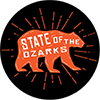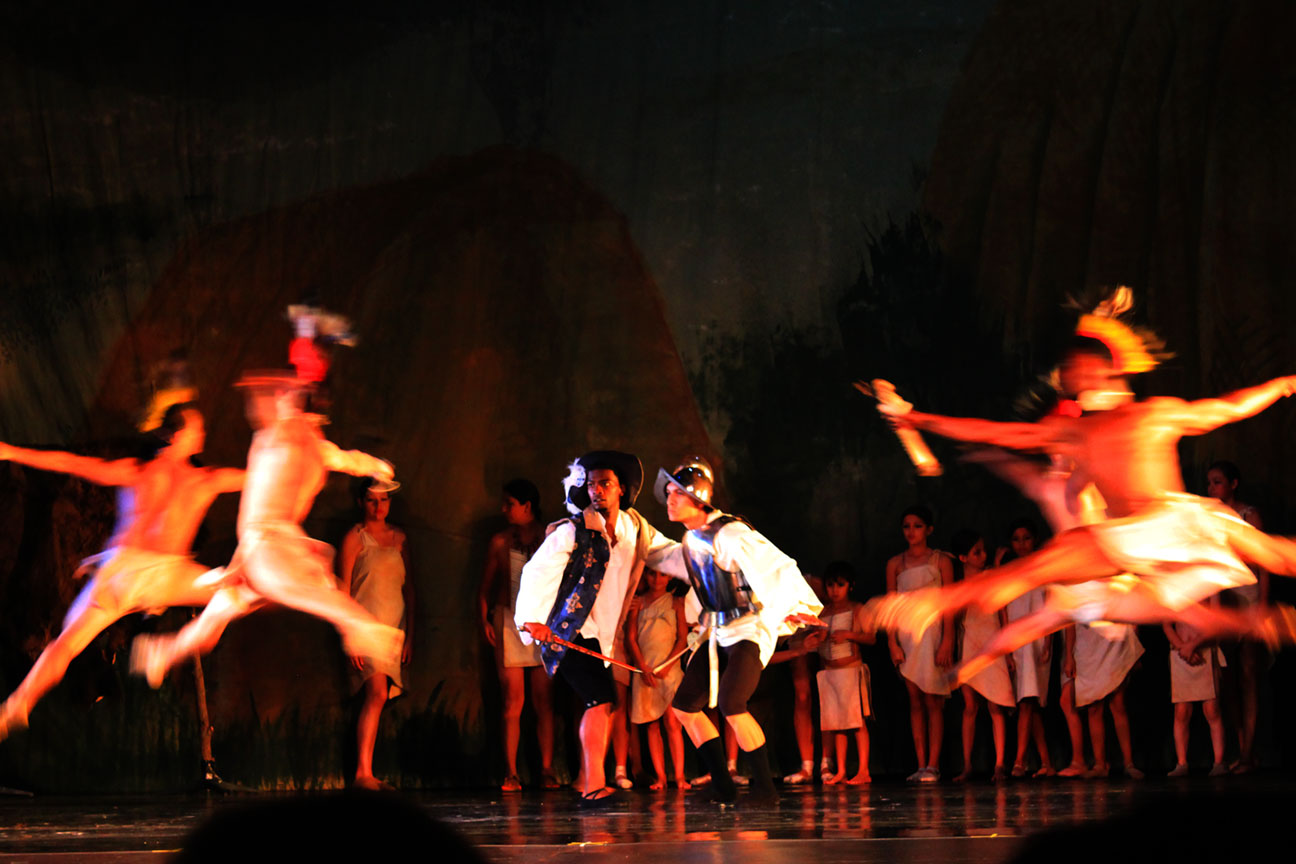Osage History
by Joshua Heston
A summer rain is coming. Clouds gathering over dusty streets, the old brick buildings of downtown and the white Moorish spires and porticos of the Coleman Theatre — a lavish movie palace built by mining dollars back in 1929.
The wind dies and main street is still, save for the bustle at the theater’s wide glass doors.
Miami, Oklahoma is a wide open place and — just beyond the Ozarks — the ever-expansive plains seem incongruous to those of us living in the hills. It is as though the sky itself doesn’t have a hinge or frame.
But this was once Indian Territory — the place determined worthless enough that hundreds of once-free tribes would be forced within to open up valuable farm and mineral land to settlers, developers and railroads.
It would not be until the discovery of oil that Indian Territory became rich territory, a unique and powerful juxtoposition of cultures and peoples now known as Oklahoma, all at the western door of the Ozark Mountains.

The clouds stay themselves for a moment more. The smell of rain is on the breeze. These plains are rich with memories, with that of a nation which once roamed freely — an ancient Sioux people known as Wahzhazhe (pronounced Ouah-Zha-ZHAY).
Encounters with the French in the far-eastern borders of the Ozarks brought their name into European records, written in French as “Osage.”
English speakers would butcher the name into “OH-sage,” just as the US government would hack Wahzhazhe culture apart. But the Osage Nation survives in Oklahoma where oil rights would turn extraordinary wealth back to the people.
Raindrops fill the afternoon air. On the stage of the Coleman Theatre, the Nation’s story begins in dance and song.
It is Wahzhazhe, An Osage Ballet, produced by Randy Tinker Smith, great-niece of America’s first Native American general, General Clarence Tinker.
This is their story. This is their dance.

Act One:
Morning Prayer
We are the Wahzhazhe — the Osage. We are a people with respect for life and the Life Giver. We begin our day with the rising sun and we pray. We see the stars and the heavens, the plains stretching before us and we realize we are but little ones.
Royalty of the Plains
We were royalty of the plains. Early missionary journals called us the “happiest people in the world.” Our lives were a sacred gift of Wakontah. Our children our promise of the future. Our gift of the present the bison, Wakontah’s gift of sustenance.
In summer we moved high into the hills where the winds were cool. In winter we went deep into the woods and hollows which held us close and warm against the snow and ice. There was unity to our people, to our clans. We were in harmony and aware of our Creator.
We were strong and beautiful.
Treaties
We first encountered Spanish explorers in 1541. The French came in the 1600s seeking fur. We understood trade and became wealthy. We built new villages near trading posts. We dominated the trade of the Santa Fe Trail for 100 years. We could live in peace with the French.
But our Nation was in the way of others. We made treaties but they were broken. Our lands grew small.
Forced Moves
All our tribes were thought sub-human by the “civilized” peoples of the United States. The truth? Our land was rich and we stood in the way of their progress.
Our great-grandparents watched as open land was taken away, then sold back to them in parcels. They watched as blankets infected with smallpox were given to their children.
As we were moved from Missouri to Kansas to Indian Territory, our clans disintegrated. Half our nation died from smallpox, yellow fever, and scurvy.
It was 1871. We had bought our own reservation — Osage County, Oklahoma. At dawn the next day — as we prepared to leave Kansas — the air was filled with the cries of the old people and the women.
We knew we were leaving the graves of our children forever. But the bison were gone. Fences blocked our old paths. The Wahzhazhe were starving.
We had no other choice.


Act Two:
Boarding Schools
Many years before, our elders chose to turn from the old ways. In 1820, a delegation of Osage asked Reverend DeBor of New Orleans to send priests to teach our children.
Our elders knew their children must learn European ways if our Nation was to survive. Boarding schools were built and we sent our children to those schools. It hurt our elders to lose their culture but they chose never to speak of their pain.
Pawkhuska Oil
Our experience with the US government’s ways was not lost on us. When the treaties first began, we did not understand land ownership. Most of us did not want to become farmers. We had lived communally for all the ages, travelling freely over millions of acres.
But we learned. With the Osage Reservation, we had the foresight to hold on to the mineral rights. Then oil was found and the Osage became wealthy. But our reservation swelled with land-grabbers.
With them came greed, crime, theft, murder.
It was a reign of terror.
Our people were being murdered for their oil rights. Poisoned. Shot. Our homes were blown up with dynamite. The Osage Council finally asked the US government to intervene. One of the first acts of the newly formed FBI was to solve the Osage murders.


Masters of the Battlefield.
We have always been a magnificent people, known for our stature, our cunning, our intelligence. We commanded respect and inspired fear: noble and generous with our friends, terrible to our foes. Even after we changed our ways of life, our fighting spirit remained. Osage men and women have fought — alongside non-Native Americans — in every US War.
We believed in the treaties we signed even when the US government did not. We as a nation stand with our allies. We fought in the Civil War. Our young men marched to Europe in World War I just as they marched around the globe in World War II.
We are a warrior people.
We Walk in Two Worlds.
The old days are now gone. We live in a world of technology; a world in which there is always hurry. The beauty of the land is replaced with steel and glass. It is an era in which waste is a past-time and making a living has replaced truly living.
But even so, we reach back and remember…
There was a time when the trees and grass surrounded us, moving gently in the morning breeze. We followed the bison across the plains and thanked them for their sacrifice.
Now, our hearts are divided. We are strong and courageous, choosing to walk in two worlds — hanging on to the threads of our culture and tradition in a world both fast and cold.
But our heart and home will always be in stretching our legs across the plains, singing songs in the morning light, placing our feet down with the ever-beating heart of the drum.
For we walk in two worlds.
Originally published November 25, 2014

Photo credits: J. Heston. July 27, 2014, Coleman Theatre, Miami, Oklahoma.
Ballet is an artistic expression of a particular perspective on real-world events. The history presented in this program does not presume to be all-inclusive or universal but is rather a partial artistic representation of the vast history that has been the experience of the Osage people.




Credits:
Director, Randy Tinker Smith / Choreography, Jenna Smith / Ballet Mistress, Sher’ron Underwood / Composers, Lou Brock & Joseph Rivers, PhD / Orchestrator, Joseph Rivers, PhD / Costumes, Wendy Ponca & Terry Wann / Scenario, Alexandra Ponca Stock / Traditional Headpieces, Amy Farid
Principal Dancers:
Amity Bevard (Osage, Ponca, Comanche), Katherine Boatright, Eric Glenn, Chadrick Jones, Corrick Jones, Zoe Marinello-Kohn, Heather Kotelenets, Alexander Kotelenets, Arthur Rocha, Jenna Smith (Osage, Cherokee), Tristan Sean Steigerwald, Sarah Ellis Worden
Apprentices:
Kellsie Bettinger (Cherokee), Raven Brumley (Osage, Cherokee), Andrew Cote (Osage, Penobscot), Jordan Cunningham (Osage, Potawatomi, Seneca), Liliana Guillen (Creek), Ian Kohnle (Osage), Israel Kohnle (Osage), Margo Miller (Osage, Shawnee), Meris Miller (Osage, Shawnee), Kelci Pickering (Otoe Missouria), Carina St. John (Osage), Kaya Sweeden (Osage), Shelby Waters (Inupiat, Cherokee)
Actors:
Jared Jirele, Chris Jones, Elizabeth Lockett (Osage, Seminole), Emmy Lockett (Osage), Neils Lockett (Osage, Seminole), Audrey Webb-Lockett (Osage), Faith Rackliff (Osage), Hayley Sweeden (Osage), Xavier Michael-Young (Delaware, Seminole)
Osage War Mothers:
Helen Brumley (Osage), Margie Burkhart (Osage), Mary Elsberry, Sheri Mashburn (Osage)
Osage Dancer:
Ricky Eves (Osage)
Osage Elders:
Raymond Andrew Lowe (Creek, Seminole), Kelly Pickering (Otoe-Missouria)
Osage Singers:
Andrew Cote, Andrea Kimble, Celina White (coordinated by Scott George)
Violinist:
Ronamarie Jensen
Cellist:
Diane Buchianari








